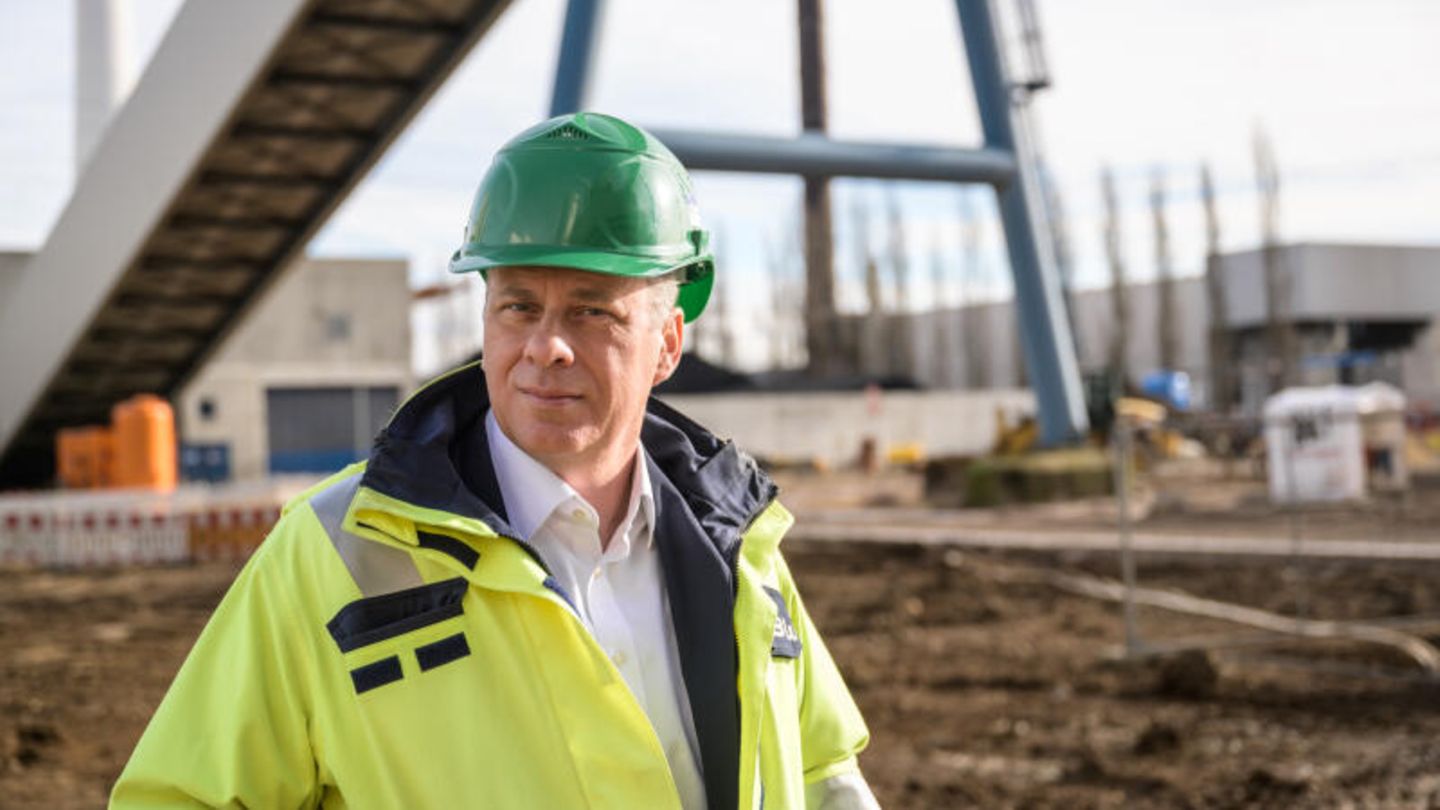interview
In order to achieve the energy transition, Georg Stamatelopoulos, head of the Stuttgart energy group EnBW, is calling for CO2 to be allowed to be stored underground. A conversation on the construction site of a hydrogen-capable gas power plant
Mr. Stamatelopoulos, Federal Minister of Economics Robert Habeck recently announced that Germany is with the energy transition “on course”. Will we actually be able to phase out coal by 2030?
One must say in advance: The law still stipulates a coal phase-out in 2038. The federal government wants to bring this date forward to 2030 if possible, as stated in the coalition agreement. The project is extremely ambitious, but we could still do it. We have always said that in order to accelerate the phase-out of coal, significant progress is needed in the expansion of renewable energies and networks. This also requires rapid investments in new, flexible, hydrogen-capable gas power plants. The appropriate framework conditions must be created for this. The ball is now in the politicians’ court.
EnBW likes to position itself as a pioneer of the energy transition. But not only nationwide, there are also problems with the expansion of wind power, photovoltaics and power grids. What if we don’t succeed in the transformation in the end?
That would be a fatal signal. Decarbonization is progressing everywhere, in all areas of the economy, in all parts of the world. We have to get this done. And I believe that we as EnBW are doing everything that is possible under the given conditions.

© Stern/Matthias Jung
To person
Georg Stamatelopoulos, 54, new CEO of EnbW, on the construction site in Altbach. At the time of the interview, he was still the board member for sustainable generation infrastructure. The engineer with a doctorate in mechanical engineering was born in Athens and joined the Stuttgart group in 2010.
They have started to become hydrogen-capable Gas power plants to be built before the federal government had announced its power plant strategy. What makes you confident that this billion-dollar investment will pay off?
Yes, we were quick, the three power plants will go into operation in 2026, and that doesn’t give me any sleepless nights. On the one hand, these gas power plants also produce district heating for industry and households, which brings additional revenue. We also receive the “Fuel Switch Bonus” because we switch off coal-fired power plants. Changing the fuel is immediately good for the climate: natural gas emits up to 60 percent less CO2 than coal.
How did the approval go? Did the authorities work quickly?
A power plant like this is a large project with considerable complexity. Against this background, the collaboration went well, particularly with the Stuttgart regional council. We submitted the application at the beginning of 2023, and the decisions on partial approvals were made relatively quickly and on time, although not yet completely digitally. Here in Altbach we were able to begin construction work.
In order to phase out coal by 2030, at least 17 more gas power plant blocks must be built across the country. Is that still achievable?
Theoretically yes. In the best case, four to six years are sufficient from application to commissioning.
Theoretically?
The question is: is there enough manufacturing capacity? There are major bottlenecks in the production of gas turbines. Not only Germany needs them, but all of Europe, the whole world. You can count suitable manufacturers on one hand. And: If everyone is now standing in line, then of course you will have to pay a significantly higher price in order to be served quickly.
The whole world is also demanding green hydrogen. When do you think it will be sufficiently available to be able to operate your gas power plants in a truly climate-neutral way?
We assume the mid-thirties. I’m a little hesitant because here too, a lot depends on the general conditions. If only “green” hydrogen is permitted for the power plants, which is produced using green electricity through electrolysis, then a quick changeover will be more difficult because there is not yet sufficient capacity for this. If we also allow “blue” hydrogen, which is obtained from natural gas and from which the Co2 is removed during the process, then we might be able to switch over as early as the early 1930s.
The technology of extracting CO2 and injecting it underground over the long term – called CCS – is controversial and actually banned in this country. Do you think this ban needs to be dropped?
There is already a draft law on this, so there is obviously a rethinking in politics. In terms of climate policy, it would be desirable. We are not planning on this for our power plants: the construction of the infrastructure here will probably take five to ten years. For example, you need pipelines that take the CO2 to a safe storage location, usually these are locations near the coast or the ocean itself. When I look at the difficulties there are in approving even one wind turbine or power line in Germany, I am I’m not really confident about such CO2 pipelines crossing the country.
In your opinion, what would be an appropriate approval deadline for climate projects?
One to one and a half years, that’s where politics has to come. The challenge: Wind turbines are approved decentrally. That’s a good thing, but in the past there was often a lack of staff to process many applications in parallel. The state government of Baden-Württemberg has now set up a kind of competition to see which districts are making the best progress. I believe something like this works together with an increase in administrative staff and can significantly increase the pace.
Source: Stern



